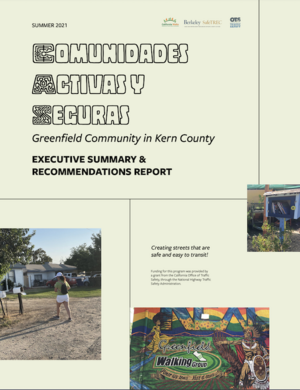Rethinking Traditional Outreach and Engagement Strategies
Recently, professionals and policymakers have considered an equity approach not only to reach and engage a diverse, representative group of community members, but to develop plans, projects, and policies that are inclusive of the community. In a new policy brief, "Engagement of Latine Communities in Transportation Safety," UC Berkeley SafeTREC's Policy & Program Analyst Ana I. Lopez, Co-Director Jill F. Cooper, and California Walks' Policy & Programs Coordinator Alma Leyva provide an overview of how engaging Latine1 communities requires rethinking traditional engagement and developing strategies that have considerations for the range of factors that shape this diverse community’s experience, including culture, social inequities, and socio- and geopolitical factors. Read the full brief for a selection of best practices for engaging Latine communities and explore a sampling of highlights below.
Non-traditional Engagement Strategies
- Sensory Engagement Activity: Sensory engagement is a non-traditional form of engagement that recognizes the central role of imagination and personal experience in transportation planning.
- Trauma Informed Community Engagement: The disproportionate number of crashes occurring in BIPOC communities suggests that these communities may be facing higher levels of trauma in comparison to other sociodemographic groups. When engaging Latine communities, it is important to acknowledge the community’s trauma as a result of traffic injuries.
- Empowerment of Communities through Shared Responsibilities and Ownership of Project: Providing meaningful opportunities for community members to take ownership of planning, outreach, and education projects help promote empowerment and foster transfer of knowledge between community residents and agency staff.
The Comunidades Activas y Seguras (Safe and Active Communities) Program
UC Berkeley SafeTREC and California Walks have undertaken a new pilot program in 2021, Comunidades Activas y Seguras, to improve walking and bicycling safety in Spanish speaking communities throughout California. This program built its curriculum with Spanish-speaking communities at the center, developing everything in Spanish first and in a way that can be understood culturally and linguistically. The program will continue in the Fall of 2021 and can serve as an opportunity to learn more about non-traditional engagement in transportation safety. Learn more about the program and access Executive Summary Reports from trainings here.
1In this research brief, the term Latine and Latines encompasses people of Latin American origin or descent who identify as Latina, Latino, or non-binary Latines. ‘Latinx’ was formerly used to address the gender inequality rooted in Spanish Language, but recent articles suggest that Latine is more linguistically appropriate (New York Times, 2020; 2021).
Funding for this program was provided by a grant from the California Office of Traffic Safety (OTS) through the National Highway Traffic Safety Administration (NHTSA).
